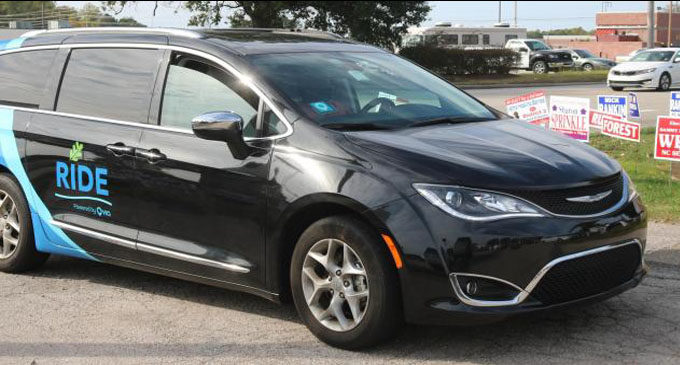Winston-Salem could benefit from ridesharing services other cities are offering
One of the autos Wilson uses in its ridesharing service.

By John Railey
Wilson, a city of about 50,000 in Eastern North Carolina, has replaced its bus system with an Uber-like car ridesharing service, Via, that gets its patrons to their destinations faster and more efficiently. “It saves me a lot of time,” one rider, who uses the system to get to work, said. “It’s a lot better than the city bus system I used to have to ride.”
Nationwide, other cities are testing similar plans, such as in Birmingham, where the city and a community foundation are doing a pilot program. It is past time for such a program here.
Last week, Winston-Salem Mayor Allen Joines indicated openness to a system like the new one in Wilson. “Transportation is a critical issue in addressing poverty,” he said. “This is an interesting concept and I look forward to learning more about it.”
Interim Assistant City Manager Aaron King said Donna Woodson, the general manager of the Winston-Salem Transit Authority (WSTSA), “has a call set up with Via to understand how the service works and get a better understanding of it.”
Those who ride WSTA buses have lived with a hard truth for years: The buses are inefficient in transporting them to work, school, grocery stores, doctors’ offices and other crucial appointments. The inefficiency was aggravated a few years ago when most of the buses went from running every thirty minutes to every hour.
Winston-Salem State University’s Center for the Study of Economic Mobility (CSEM) has documented the challenges with its research findings, including the fact that riders who use the buses to get to work spend an average of 12 hours a week on buses. CSEM Founding Director Craig Richardson calls that a time tax. It saps the economy by inhibiting job performance and time working parents could spend helping their children with schoolwork.
Wilson, with a population less than a fourth as large as Winston’s, is reducing that time tax with its ridesharing service. “It’s been quite the success,” said Rodger Lentz, the city’s chief planning and development officer. Patrons wait, on average, 13 minutes for their ride, compared to an average of 45 minutes under the former bus system.
“Our buses just ran every hour,” said Gronna Jones, the city’s transportation manager. “If you went outside and saw the taillights on the bus, you automatically knew you had to wait an additional hour before the next bus came. It’s been a great improvement in customer service.”
Wilson contracted with Via to offer the on-demand, microtransit service. Nearly 90% of Via’s more than 2,000 trips per week “are for essential activities, including commuting to and from work and to grocery stores, banks, and for healthcare,” the city said in a recent press release.
City officials said 52% of the patrons of the new system say they use it to get to work. “That was one of our goals, was connecting people to employment opportunities,” Lentz said.
One rider said his walks to visits with his doctor took almost an hour. Now, he said, Via gets him there in less than five minutes.
Wilson started the service in September 2020. It is “a blend between apps like Uber or Lyft and a public transit system,” WRAL, the Raleigh-based TV station, reported. “By either using an app or calling in, passengers can arrange a ride, get picked up outside their current location, and share a trip to their location with passengers headed in the same direction. The cost of each ride is $1.50 for a single passenger and an extra $1 for an additional passenger. Children eight years old and younger can ride for free.”
Wilson contracted with Via after Lentz and City Manager Grant Goings brainstormed ways of easing transportation to work. Wilson, like Winston-Salem, is not especially pedestrian friendly. There, just as in Winston now, the bus system was not addressing that challenge.
Wilson’s Via system runs from 5:30 a.m. to 7 p.m., an increase of the bus system’s hours. It costs $1.4 million annually as opposed to $1.2 million for the bus system, but Lentz said it’s worth the cost. They’ve expanded public transportation’s geographic footprint – the system now covers the entire city – and decreased waiting and ride times, he said. The city secured grants from the Federal Transit Administration’s Accelerating Innovative Mobility Initiative, in partnership with the North Carolina Department of Transportation.
Brittany Marshall of Winston-Salem, who rode WSTA buses to work for years before finally buying a car, said Winston could benefit from a system like Wilson’s. “It would be better for people who have children who have to stand out in the rain and the cold and the heat waiting for buses,” said Marshall, whose young son often rode the bus with her. She was featured in a 2018 CSEM documentary on the local bus system, “Bus Stop Jobs.”
In large part in response to CSEM’s transportation research, The Winston-Salem Foundation set up a round of grants for equitable transportation programs. Charlie Gardner, a foundation program officer coordinating those grants, has studied the programs in Wilson and Birmingham. He noted that Wilson is much smaller than Winston, and the Burlington program is a pilot program with a limited geographic footprint.
He said such a program here wouldn’t be a viable replacement for transit buses, but could serve as a supplement. It would have to be a “balancing act” with issues such as making sure senior citizens without Smartphones are not left out, he said. Such a program would need both community buy-in and support from multiple partners so it “could be a worthwhile thing to explore,” he said.
Lentz, the Wilson planning and development officer, said it might not work for Winston to cut off its entire bus system, but Via could certainly be used in areas not reached in a timely fashion by the bus system.
Richardson, the CSEM director, said Winston-Salem could test using Via in an area with the same perimeter as Wilson’s system. “If Wilson can do it, why not us?” he asked.
Brittany Marshall agreed. And that option would also allow the city to take into account bus drivers and other personnel who might lose jobs with a new system. But all in all, she said, a Via system “could be really good for folks riding the buses now.”
For more about CSEM’s transportation research, go to Working Papers – Winston-Salem State University (wssu.edu)
John Railey, the writer-in-residence for CSEM, can be reached at raileyjb@gmail.com.
















